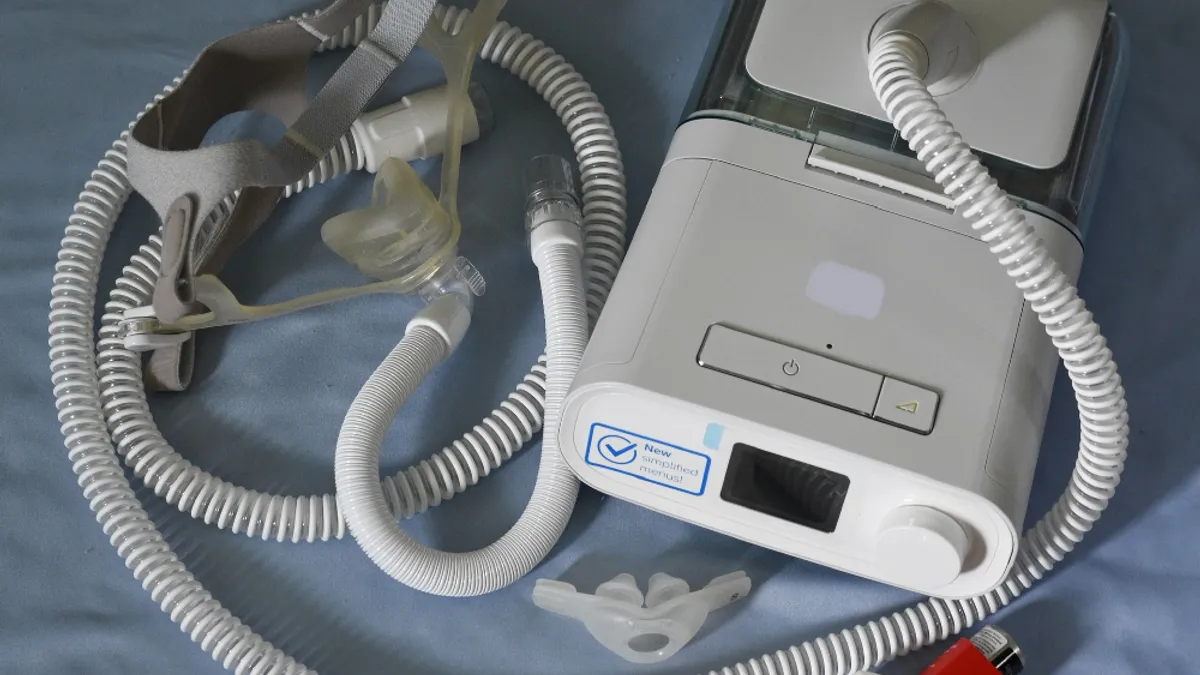Attorneys who filed a class action lawsuit against Philips over its now-recalled respiratory devices filed additional court papers on Monday detailing what they called delays in the company’s response to alleged health risks leading to the recall of millions of its breathing support devices.
The suit alleges that Philips knew of the risks of using polyester-based polyurethane foam to quiet its respiratory devices years before it warned customers and issued a recall.
The case, filed in federal court in Pennsylvania, alleges that plaintiffs were diagnosed with a wide range of health conditions including cancer, chronic obstructive pulmonary disease and kidney disease, as well as heart and lung injuries from using ventilators and sleep apnea devices insulated with the allegedly toxic foam.
"Philips knew about the serious health risks posed by its now-recalled CPAP, Bi-PAP, and mechanical ventilator devices as early as 2015, but failed to warn consumers or alert the proper authorities until years later,” the plaintiffs’ attorneys said in a joint emailed statement.
Philips initiated a recall of millions of its sleep apnea and ventilator devices in June 2021 because to health risks linked to the sound abatement foam used in the devices. The polyester polyurethane, or PE-PUR, foam used in the devices can break down into particles that can be inhaled or ingested, which may cause headaches, dizziness, irritation, nausea and carcinogenic effects, the company warned.
Since then, the recall has ballooned to cover more than 5.5 million devices. The Food and Drug Administration has received more than 69,000 medical device reports related to the issue, including 168 reports of death, although these reports are not proof the respirators were responsible. Millions of patients still are waiting for replacement devices as Philips faces supply chain issues and an unexpected number of replacement requests,
“Philips has at least 2 million patients waiting over a year now while using a device that may cause cancer or death,” said Tom Wilson, who runs a Facebook group for people who rely on the recalled devices. “There is an almost complete lack of consumer communication. No one knows when they will get a replacement or what they might receive.”
A spokesperson for the lead plaintiffs' counsel said about 300 lawsuits have been filed and as many as 60,000 personal injury cases could be consolidated in the case under an agreement with Philips.
The lawsuit alleges Philips knew about the health risks before it started the recall or warned customers.
“Philips should have known about the risks caused by PE-PUR foam degradation when it was testing the foam pursuant to FDA regulation,” the complaint stated. “And certainly, Philips knew as far back as 2008 that there were serious problems with the foam in the Recalled Devices because Philips received customer complaints about ‘contaminants, particles, foam, debris, airway, particulate, airpath” and other issues.
For instance, the lawsuit states that one adverse event report dating back to 2011 shows a patient discovered “black dust” on her nose when she awoke after using a Philips RemStar CPAP device, and subsequently underwent treatment for “intoxication” and “chest tightness.” After investigating the report, Philips confirmed the device contained evidence of an unknown black substance in the air path and on the internal components, according to the complaint.
Philips could have also turned to better alternatives for sound abatement, the suit alleges. PE-PUR is prone to breakdown when it reacts with water, it said, adding that Polyether polyurethane, one of the sound abatement foams used by competitor ResMed, is less susceptible to this problem.
The plaintiffs are accusing Philips of negligence, design defect, negligent design, failure to warn, and negligent failure to warn. Royal Philips NV, the Dutch-based multinational, and its subsidiaries are listed as defendants in the lawsuit, as well as Polymer Technologies, the company that provided Philips with the PE-PUR foam in the devices.
Philips said in an emailed statement late Tuesday that it is “working hard to repair or replace affected sleep and respiratory care products as quickly as possible.” The company said a review of 13 epidemiological studies showed “no association has been established between use of Continuous or Bilevel Positive Airway Pressure (PAP) devices, including Philips Respironics PAP devices, and risk of cancer in patients with obstructive sleep apnea (OSA).“
In an interview with Medtech Dive published last month, Roy Jakobs, the Philips executive overseeing the recall, said the company knew of issues with the devices before it issued a recall notice.
“In early 2021, when we saw the complaints rising more steeply, we did the testing, and we said we really want to take proactive measures out of an abundance of caution,” Jakobs said. “But there was an earlier discovery within Respironics that they dealt with on an individual basis,” before the recall was issued, he said. The Respironics division manufactured the breathing devices.
Last week, Jakobs was named to replace CEO Frans van Houten, who will step down on Oct. 15.
Attorneys representing the plaintiffs include Sandra Duggan of Levin Sedran & Berman, Kelly Iverson of Lynch Carpenter, Christopher Seeger of Seeger Weiss, and Steven Schwartz of Chimicles Schwartz Kriner & Donaldson-Smith.
This article has been updated to include comment from Philips.


















